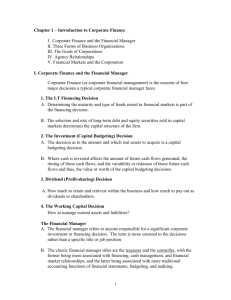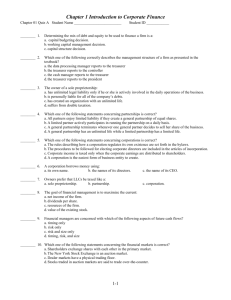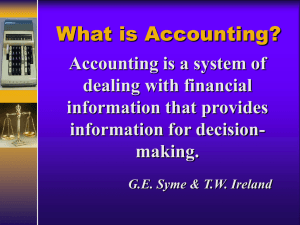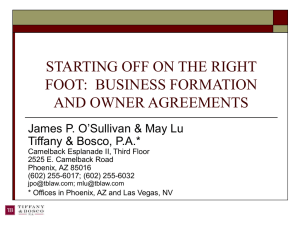Corporations - the Witkin Legal Institute
advertisement
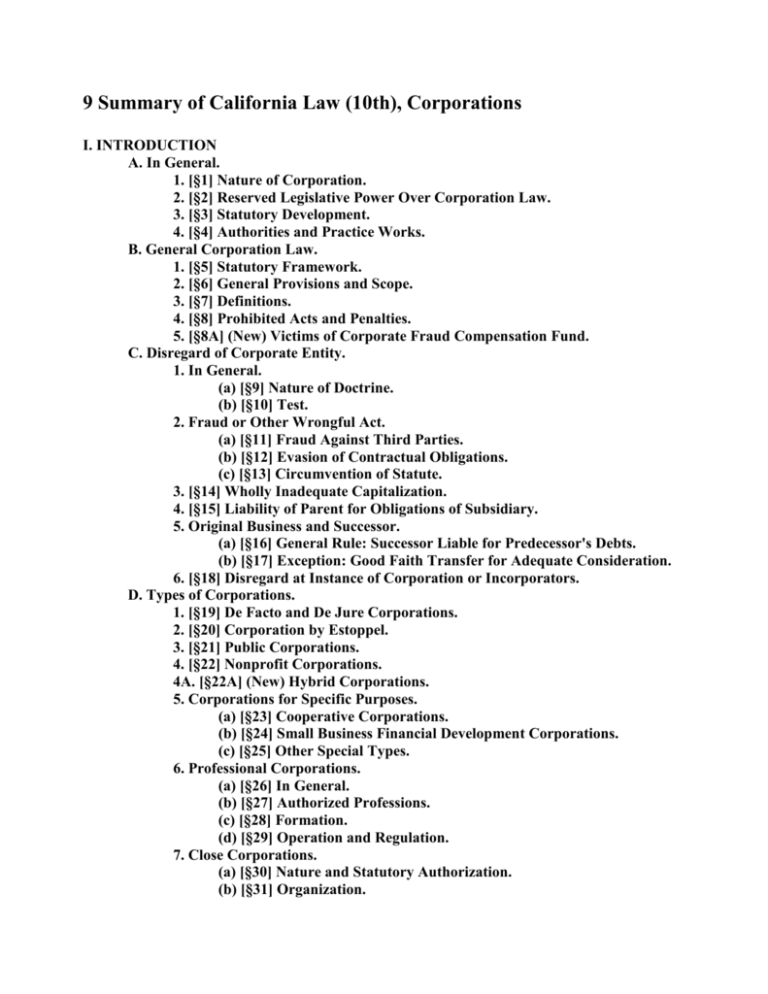
9 Summary of California Law (10th), Corporations I. INTRODUCTION A. In General. 1. [§1] Nature of Corporation. 2. [§2] Reserved Legislative Power Over Corporation Law. 3. [§3] Statutory Development. 4. [§4] Authorities and Practice Works. B. General Corporation Law. 1. [§5] Statutory Framework. 2. [§6] General Provisions and Scope. 3. [§7] Definitions. 4. [§8] Prohibited Acts and Penalties. 5. [§8A] (New) Victims of Corporate Fraud Compensation Fund. C. Disregard of Corporate Entity. 1. In General. (a) [§9] Nature of Doctrine. (b) [§10] Test. 2. Fraud or Other Wrongful Act. (a) [§11] Fraud Against Third Parties. (b) [§12] Evasion of Contractual Obligations. (c) [§13] Circumvention of Statute. 3. [§14] Wholly Inadequate Capitalization. 4. [§15] Liability of Parent for Obligations of Subsidiary. 5. Original Business and Successor. (a) [§16] General Rule: Successor Liable for Predecessor's Debts. (b) [§17] Exception: Good Faith Transfer for Adequate Consideration. 6. [§18] Disregard at Instance of Corporation or Incorporators. D. Types of Corporations. 1. [§19] De Facto and De Jure Corporations. 2. [§20] Corporation by Estoppel. 3. [§21] Public Corporations. 4. [§22] Nonprofit Corporations. 4A. [§22A] (New) Hybrid Corporations. 5. Corporations for Specific Purposes. (a) [§23] Cooperative Corporations. (b) [§24] Small Business Financial Development Corporations. (c) [§25] Other Special Types. 6. Professional Corporations. (a) [§26] In General. (b) [§27] Authorized Professions. (c) [§28] Formation. (d) [§29] Operation and Regulation. 7. Close Corporations. (a) [§30] Nature and Statutory Authorization. (b) [§31] Organization. (c) [§32] Agreement. (d) [§33] Transferring and Voting Shares. (e) [§34] Termination. E. Corporations Compared With Other Entities. 1. [§35] Partnership. 2. [§36] Limited Liability Company. 3. Unincorporated Association. (a) [§37] In General. (b) [§38] Common Associations. (c) [§39] Entity Status. (d) [§40] Liability. (e) [§41] Control Over Members. (f) Rights and Remedies of Members. (1) [§42] Inspection of Records. (2) [§43] Judicial Remedies. (g) Admission to Membership. (1) Medical Society or Hospital Staff. (aa) [§44] In General. (bb) [§45] Fair Procedure Requirement. (2) [§46] Fraternal or Honorary Society. (h) [§47] Suspension or Expulsion. (i) [§47A] (New) Merger. (j) [§47B] (New) Dissolution. 4. Business Trust. (a) [§48] Nature of Association. (b) [§49] Liability of Beneficiaries. (c) [§50] Liability of Trustees and Trust Estate. (d) [§51] Real Estate Investment Trust. F. Promoters. 1. [§52] Nature and Function. 2. [§53] Duty of Disclosure. 3. [§54] Fraud Against Future Subscribers. 4. [§55] Contracts. II. FORMATION OF CORPORATIONS A. [§56] In General. B. Articles of Incorporation. 1. Required Provisions. (a) [§57] name. (b) [§58] Statement of Purpose and Agent for Service of Process. (c) [§59] Stock and Stock Preferences. 2. Optional Provisions. (a) [§60] Provisions Permissible in Articles or Bylaws. (b) [§61] Provisions Ineffective Unless Included in Articles. 3. [§62] Execution and Filing. 4. Amendment of Articles. (a) [§63] Power To Amend. (b) [§64] Limitations on Amendment. (c) Certificate of Amendment. (1) [§65] Amendment Before Shares Are Issued. (2) [§66] Amendment After Shares Are Issued. (3) [§67] Establishing Wording of Amendment. (4) [§68] Filing. (d) Required Votes. (1) [§69] Before Issuance of Shares. (2) [§70] After Issuance of Shares. (3) [§71] Amendments Having Adverse Effect. (e) [§72] Restating Articles. C. Bylaws. 1. [§73] Adoption and Amendment. 2. [§74] Provisions. D. [§75] Annual Statement. E. [§76] Agent for Service of Process. F. [§77] Certificate of Correction. III. DIRECTORS AND OFFICERS A. In General. 1. [§78] Qualifications, Term, and Election. 2. [§79] Resignation and Removal. 3. [§80] Compensation. 4. Indemnification. (a) [§81] Nature and Scope of Statute. (b) Conditions Justifying Indemnification. (1) [§82] Agent Successful on Merits. (2) [§83] Actions on Behalf of Corporation and Other Proceedings. (3) [§84] Authorization Required for Indemnification. 5. [§85] Right of Inspection. B. Meetings and Board Action. 1. [§86] Exercise of Corporate Powers. 2. [§87] Calling and Noticing Meetings. 3. [§88] Transaction of Business. 4. [§89] Provisional Director To Break Deadlock. C. Fiduciary Relationship of Directors. 1. Relations With Corporation. (a) [§90] Personal Profits. (b) Competition. (1) [§91] Doctrine of Corporate Opportunities. (2) [§92] Inducing Employees To Join Competitor. (c) Transactions Between Director and Corporation. (1) [§93] Test of Validity. (2) [§94] Fraud or Unfairness. (3) [§95] Contract Fixing Compensation. (4) [§96] Golden Parachute. (d) [§97] Delegation of Functions or Surrender of Control. 2. Relations With Shareholders. (a) [§98] In General. (b) Duty of Disclosure. (1) [§99] Special Facts. (2) [§100] Other Situations. 3. [§100A] (New) Relations With Creditors of Insolvent Corporation. D. Liabilities of Directors. 1. [§101] Unauthorized Distributions, Loans, and Guaranties. 2. Negligence, Mismanagement, and Fraud. (a) [§102] In General. (b) [§103] Reliance on Information Provided by Others. (c) [§104] Sanctions for Misrepresentation or Fraud. 3. [§105] Acts of Other Directors or Officers. 4. [§105] Intentional Tort. 5. [§106] Limitation on Liability of Directors. E. Other Officers and Agents. 1. [§107] In General. 2. Authority To Bind Corporation. (a) [§108] In General. (b) [§109] Implied Authority of Executive Officers. (c) [§110] Signatures on Written Instruments. F. [§111] De Facto Directors and Officers. IV. CORPORATE POWERS A. [§112] In General. B. Distributions to Shareholders. 1. [§113] In General. 2. [§114] Redemption. C. Gift or Loan of Assets or Credit. 1. [§115] Gifts and Contributions to Charity and Education. 2. [§116] Political Contributions for Business Purpose. 3. [§117] Lending Credit. 4. [§118] Loans or Guaranties to Directors or Officers. D. [§119] Transfer of All Assets. E. Ultra Vires Acts. 1. [§120] Doctrine Abolished as to Third Parties. 2. [§121] Rights of Corporation and Shareholders. 3. [§122] Illegal and Fraudulent Acts. V. SHARES OF STOCK A. In General. 1. [§123] What Constitutes Share. 2. [§124] Classes and Preferences. 3. [§125] Valuation and Payment. 4. [§126] Certificates of Stock. 5. [§127] Preincorporation Subscription Agreements. 6. [§128] Securities Regulation. B. Transfer of Shares. 1. [§129] Valid Restrictions. 2. [§130] Statement on Certificate. 3. [§131] Authorized Transfers. C. Investment Securities Under Commercial Code. 1. In General. (a) [§132] Statutory Development. (b) [§133] Scope of Code. (c) [§134] Securities Defined. (d) [§135] Statute of Frauds. (e) [§136] Choice of Law. 2. [§137] Issue and Issuer. 3. Transfer of Securities. (a) [§138] Delivery. (b) [§139] Warranties. 4. [§140] Rights of Purchaser. 5. [§141] Rights of Creditors. 6. Registration. (a) [§142] Rights of Owner and Purchaser. (b) [§143] Duty of Issuer To Register. (c) [§144] Duty of Issuer To Replace Lost Security. (d) [§145] Liabilities of Issuer. (e) [§146] Agent for Issuer. 7. Security Entitlements. (a) [§147] In General. (b) [§148] Property Interest of Entitlement Holder. (c) [§149] Duties of Securities Intermediary. VI. SHAREHOLDERS A. In General. 1. [§150] Shareholders of Record. 2. [§151] Nature of Rights. 3. [§152] Inspection of Records. 4. [§153] Annual Report and Financial Statement. 5. [§154] Recovery for Wrongfully Induced Retention of Shares. B. Meetings and Elections. 1. [§155] Time and Place. 2. [§156] Notice and Waiver. 3. [§157] Quorum. 4. [§158] Notification of Results. C. Voting. 1. In General. (a) [§159] Shareholders of Record. (b) [§160] Fiduciaries. (c) [§161] Shares Held by Another Corporation. 2. [§162] Cumulative Voting. 3. Proxies. (a) [§163] Validity and Duration. (b) [§164] Regulation of Solicitation. 4. [§165] Voting Agreements and Trusts. D. Dividends. 1. [§166] Nature and Kinds of Dividends. 2. [§167] Discretion of Directors. 3. [§168] Ownership of Dividend: Time of Declaration. 4. [§169] Rights of Preferred Shareholders. E. Derivative Suits. 1. [§170] In General. 2. [§171] Contemporary Ownership Requirement. 3. [§172] Demand on Directors To Act. 4. Personal Action by Shareholder. (a) [§173] Joinder. (b) [§174] Action Based on Fraud. (c) [§175] Action by Insured Shareholder. 5. Security for Costs. (a) [§176] Nature of Statute. (b) [§177] Statute Is Not Applicable to Personal Action. 6. [§178] Compromise, Dismissal, and Appeal. 7. [§179] Attorneys' Fees to Plaintiff. F. Fiduciary Obligations of Controlling Shareholders. 1. [§180] General Principle. 2. [§181] Illustrations. G. Liability of Shareholders to Corporation. 1. [§182] Calls on Partly Paid Shares. 2. [§183] Assessment Under Stated Power. 3. [§184] Unlawful Dividends or Purchases of Shares. H. Liability of Shareholders to Creditors. 1. [§185] Partly Paid Shares. 2. [§186] Fraud and Watered Stock. VII. REORGANIZATION A. Types of Reorganizations. 1. [§187] Merger Reorganization. 2. [§188] Exchange Reorganization. 3. [§189] Sale-of-Assets Reorganization. 4. [§190] Readjustment To Eliminate Arrearages. 5. [§191] Bankruptcy Reorganizations. B. [§192] Board Approval. C. Shareholder Approval. 1. [§193] When Not Required. 2. [§194] When Required. 3. [§195] Voting and Appraisal Rights. D. Merger Procedure. 1. [§196] Merger Agreement. 2. [§197] Filing and Effective Date. 3. [§198] Rights and Liabilities of Constituent Corporations. 4. [§199] name and Ownership of Real Property. E. Dissenting Shareholders' Rights. 1. [§200] In General. 2. [§201] Conditions and Restrictions. 3. [§202] Determining Value of Shares. 4. [§203] Shareholder's Election. 5. [§204] Appraisal Right as Exclusive Remedy. F. [§205] Abandonment. G. Conversion. 1. [§206] In General. 2. [§207] Plan. 3. [§208] Statement of Conversion. 4. [§209] Effect. 5. [§210] Record Ownership of Real Property. VIII. DISSOLUTION AND FORFEITURE A. Dissolution. 1. In General. (a) [§211] Methods of Dissolution. (b) [§212] Corporate Existence Continues. 2. Voluntary Dissolution. (a) [§213] Without Court Proceedings. (b) [§214] Control by Court. 3. Involuntary Dissolution. (a) [§215] Parties. (b) [§216] Grounds. (c) [§217] Procedure. (d) [§218] Election To Purchase Shares. 4. Distributions and Orders. (a) [§219] Distribution to Shareholders. (b) [§220] Creditors' Rights Against Former Shareholders. (c) [§221] Certificates and Orders. B. Forfeiture for Failure To Pay Franchise Tax. 1. [§222] Effect on Contracts and Conveyances. 2. [§223] Effect on Actions. 3. [§224] Penalties and Loss of Corporate Name. 4. [§225] Revivor by Payment of Back Taxes. IX. FOREIGN CORPORATIONS A. Right To Do Business. 1. [§226] State's Power To Impose Conditions. 2. [§227] Definitions and Governing Statute. 3. [§228] Certificate of Qualification. 4. [§229] Penalties for Failure To Comply. 5. [§230] Surrender of Right To Transact Intrastate Business. 6. [§231] Service of Process. 7. [§232] Foreign Corporation Not Transacting Intrastate Business. 8. [§233] Activities of Foreign Lending Institution. B. Conflict of Laws. 1. [§234] Formation of Corporation. 2. [§235] Dissolution of Corporation. 3. [§236] Qualifying To Do Business. 4. [§237] Corporate Powers and Liabilities. 5. [§238] Shareholders, Directors, and Officers. 6. [§239] Internal Affairs. C. Quasi-Foreign Corporations. 1. [§240] In General. 2. [§241] Constitutionality of Statute. 3. [§242] Affected Corporations. 4. [§243] Excluded Corporations. 5. [§244] Applicable Provisions. X. NONPROFIT CORPORATIONS A. In General. 1. [§245] Nature and Organization. 2. Nonprofit Corporation Law. (a) [§246] In General. (b) General Provisions and Definitions. (1) [§247] In General. (2) [§248] Filing Requirements. (3) [§249] Notice and Mailing. (4) [§250] Approval by Board or Members. B. Nonprofit Public Benefit Corporations. 1. [§251] Statutory Citation and Scope. 2. Organization and Powers. (a) [§252] Authorized Purposes. (b) [§253] Formation. (c) [§254] Corporate Name. (d) [§255] Incorporation of Existing Association. (e) [§256] Statutory Powers. (f) [§257] Raising Limitations on Powers. 3. Articles and Bylaws. (a) [§258] Contents of Articles. (b) Amendment and Restatement of Articles. (1) [§259] In General. (2) [§260] Amendment To Change Corporate Status. (3) [§261] Amendment To Extend Term of Corporate Existence. (4) [§262] Who Must Approve Amendment. (5) [§263] Certificate of Amendment. (6) [§264] Restated Articles. (c) [§265] Adoption, Amendment, and Repeal of Bylaws. (d) [§266] Contents of Bylaws. (e) [§267] Location and Inspection of Articles and Bylaws. 4. Selection, Resignation, and Removal of Directors. (a) [§268] Method of Selection and Term. (b) [§269] Restrictions on Interested Persons as Directors. (c) Election. (1) [§270] In General. (2) [§271] Nomination Procedure. (3) [§272] Solicitation Materials. (4) [§273] Cumulative Voting. (d) [§274] Action To Determine Validity of Selection. (e) [§275] Resignation. (f) Removal. (1) [§276] In General. (2) [§277] Without Cause. (g) [§278] Vacancies. (h) [§279] Provisional Directors. 5. Management of Corporate Affairs. (a) [§280] Exercise and Delegation of Corporate Powers. (b) [§281] Corporate Officers. (c) [§282] Committees. (d) Meetings. (1) [§283] In General. (2) [§284] Transaction of Business. (3) [§285] Alternative Procedure Authorized by Court. (e) [§286] Investments. (f) [§287] Supervision by Attorney General. (g) [§288] Compliance With Internal Revenue Code. (h) [§289] Distributions to Members Prohibited. (i) [§290] Transactions Involving Corporate Assets. (j) [§291] Service of Process. 6. Standards for Conducting Corporate Affairs. (a) [§292] Scope of Statutory Requirements. (b) [§293] Good Faith Performance of Duties by Directors. (c) Self-Dealing by Interested Directors. (1) [§294] In General. (2) [§295] Conditions Precluding Remedies Against Interested Directors. (d) [§296] Transactions Between Entities With Common Directors. (e) [§297] Determining Compensation. (f) [§298] Loans or Guaranties to Directors or Officers. (g) Liability for Improper Actions. (1) [§299] Scope of Liability. (2) [§300] Action To Enforce Liability. (h) Indemnification. (1) [§301] In General. (2) [§302] Conditions Justifying Indemnification. 7. Members. (a) [§303] Definitions. (b) [§304] Issuance of Memberships. (c) [§305] Transfer of Memberships. (d) Termination of Memberships. (1) [§306] In General. (2) [§307] Procedural Requirements. (e) [§308] Liability. (f) Meetings and Voting. (1) [§309] In General. (2) [§310] Notice. (3) [§311] Quorum. (4) [§312] Determining Members of Record. (5) [§313] Written Ballot in Lieu of Meeting. (6) [§314] Voting Rights. (7) [§315] Proxies. (8) [§316] Election Inspectors. (9) [§317] Waiver of Procedural Errors. (10) [§318] Alternative Procedure Authorized by Court. (11) [§319] Acceptability of Signatures. (g) Derivative Actions. (1) [§320] In General. (2) [§321] Plaintiff's Bond. 8. Mergers. (a) [§322] In General. (b) [§323] Merger Agreement. (c) [§324] Required Filings. (d) [§325] Merger With Foreign Corporation. (e) [§326] Effect of Merger. 9. Records and Reporting Requirements. (a) [§327] In General. (b) [§328] Annual Report. (c) [§329] Statement of Indemnifications and Insider Transactions. (d) [§330] Filing With Secretary of State. (e) [§331] Reports to Other Public Officers. (f) Liability for False or Deceptive Acts. (1) [§332] Civil Liability. (2) [§333] Criminal Liability. 10. Inspection Rights. (a) [§334] In General. (b) Membership List. (1) [§335] Demand for Inspection. (2) [§336] Court Order Limiting Inspection. (3) [§337] Setting Aside Inspection Demand. (4) [§338] Enforcement of Inspection Rights. (5) [§339] Improper Use of List. 11. Dissolution. (a) Involuntary Dissolution. (1) [§340] Grounds. (2) [§341] Filing Complaint. (3) [§342] Court Orders and Jurisdiction. (4) [§343] Action by Attorney General. (5) [§344] Corporate Activities. (6) [§345] Presentation and Payment of Claims. (7) [§346] Order for Dissolution. (b) Voluntary Dissolution. (1) [§347] Who Must Approve. (2) [§348] Certificate of Election. (3) [§349] Revocation of Election. (4) [§350] Corporate Activities. (5) [§351] Court Jurisdiction. (6) [§352] Certificate of Dissolution. (7) [§353] Order for Dissolution. (c) Common Provisions Relating to Dissolution. (1) [§354] In General. (2) [§355] Providing for Debts and Liabilities. (3) [§356] Distribution of Assets. (4) [§357] Effect of Dissolution. C. Mutual Benefit Corporations. 1. [§358] Statutory Citation and Scope. 2. [§359] Authorized Purposes. 3. [§360] Organization and Powers. 4. Articles and Bylaws. (a) [§361] Contents and Construction of Articles. (b) [§362] Amendment of Articles. (c) [§363] Bylaws. 5. [§364] Selection of Directors. 6. [§365] Resignation and Removal of Directors. 7. [§366] Management of Corporate Affairs. 8. [§367] Restrictions on Corporate Distributions. 9. Standards for Conducting Corporate Affairs. (a) [§368] In General. (b) [§369] Self-Dealing by Interested Directors. (c) [§370] Loans or Guaranties to Directors or Officers. 10. Members. (a) [§371] Issuance of Memberships. (b) [§372] Transfer and Termination of Memberships. (c) [§373] Liability. (d) [§374] Meetings and Voting. (e) [§375] Derivative Actions. 11. [§376] Mergers. 12. [§377] Records and Reporting Requirements. 13. [§378] Inspection Rights. 14. Dissolutions. (a) [§379] In General. (b) [§380] Involuntary Dissolution. (c) [§381] Voluntary Dissolution. D. Religious Benefit Corporations. 1. [§382] Statutory Citation and Scope. 2. [§383] Organization and Purposes. 3. [§384] Corporate Powers. 4. [§385] Articles. 5. [§386] Bylaws. 6. [§387] Selection of Directors. 7. [§388] Resignation and Removal of Directors. 8. [§389] Management of Corporate Affairs. 9. [§390] Examination by Attorney General. 10. Standards for Conducting Corporate Affairs. (a) [§391] In General. (b) [§392] Self-Dealing by Interested Directors. 11. Members. (a) [§393] Membership Rights and Liabilities. (b) [§394] Meetings and Voting. 12. [§395] Records and Reporting Requirements. 13. [§396] Mergers. 14. [§397] Dissolution. 15. [§398] Crimes and Penalties. E. Corporations for Special Purposes. 1. [§399] Corporations Sole. 2. [§400] Other Special Corporations. X-A. (New) HYBRID CORPORATIONS A. (New) Social Purpose Corporation. 1. [§400A] (New) Adoption and Effect. 2. [§400B] (New) Organization and Definitions. 3. [§400C] (New) Formation and Qualifying Purpose. 4. [§400D] (New) Director Liability. 5. [§400E] (New) Shares and Shareholders. 6. [§400F] (New) Reorganization. 7. [§400G] (New) Conversion. 8. [§400H] (New) Reports and Analysis. B. (New) Benefit Corporation. 1. [§400-I] (New) Statutory Citation and Scope. 2. [§400J] (New) Purpose. 3. [§400K] (New) Definitions. 4. [§400L] (New) Formation. 5. (New) Accountability. (a) [§400M] (New) Directors. (b) [§400N] (New) Officers. (c) [§400-O] (New) Benefit Enforcement Proceeding. 6. (New) Transparency. (a) [§400P] (New) Annual Benefit Report. (b) [§400Q] (New) Share Certificates. 7. [§400R] (New) Termination. XI. CORPORATE SECURITIES LAW OF 1968 A. In General. 1. [§401] Former Law and Revision. 2. [§402] Major Components. 3. [§403] Commissioner, Rules, and Forms. 4. [§404] Definitions and General Provisions. B. Qualification of Sale or Offer of Securities. 1. In General. (a) [§405] Theories and Classifications. (b) Securities. (1) [§406] Application of Former Law. (2) [§407] Interests Included. (3) [§408] Interests Excluded. (4) [§409] Valid Business Ventures. (c) [§410] Sale or Offer To Sell. (d) [§411] Sale or Offer in California. (e) Standards for Qualification. (1) [§412] Issuer Transactions. (2) [§413] Nonissuer Transactions. (3) [§414] Recapitalizations and Reorganizations. 2. Transactions Covered. (a) [§415] Issuer and Nonissuer Transactions. (b) [§416] Recapitalizations and Reorganizations. 3. Exemption of Securities. (a) [§417] Securities Entirely Exempt. (b) [§418] Securities Exempt From Nonissuer Requirements. 4. Exemption of Transactions. (a) Transactions Exempt From Issuer Requirements. (1) [§419] Offers and Sales by Small Corporations. (2) [§420] Offers and Sales to Institutional Investors. (3) [§421] Miscellaneous Specific Exemptions. (b) [§422] Transactions Exempt From Issuer, Recapitalization, and Reorganization Requirements. (c) [§423] Transactions Exempt From Nonissuer Requirements. (d) [§424] Transactions Exempt by Commissioner's Rule. 5. Procedure for Qualification. (a) [§425] In General. (b) Particular Transactions. (1) [§426] Issuer Transactions. (2) [§427] Nonissuer Transactions. (3) [§428] Recapitalizations and Reorganizations. (c) Authority of Commissioner. (1) [§429] Denial of Permit. (2) [§430] Stop Order. (3) [§431] Conditions of Qualification. (4) [§432] Reports and Records. (5) [§433] Miscellaneous Powers. C. Regulation of Agents, Broker-Dealers, and Investment Advisers. 1. Licensing of Broker-Dealers. (a) [§434] In General. (b) [§435] Certificate. (c) [§436] Particular Transactions. 2. Licensing of Investment Advisers. (a) [§437] In General. (b) [§438] Certificate. (c) [§439] Investment Advisory Contract. 3. [§440] Discontinuance of Activities and Administrative Penalties. D. Advertising Securities. 1. [§441] Filing Copy Before Publication. 2. [§442] Notice Not To Publish. E. Fraudulent and Prohibited Practices. 1. [§443] Creating False Market. 2. [§444] Fraud or Misrepresentation in Purchase or Sale. 3. [§445] Purchase or Sale by Insider. 4. [§446] Sale of Securities Not Qualified. 5. [§447] Assisting in Violation or Obstruction of Enforcement. 6. [§448] Offer or Sale of Fractional Interest of Local Agency Obligation. F. Enforcement. 1. Civil Liability. (a) [§449] In General. (b) [§450] Statute of Limitations. 2. Powers of Commissioner. (a) [§451] Actions. (b) [§452] Investigations. (c) [§453] Order To Desist and Restrictions on Sale. 3Criminal Prosecution. (a) [§454] In General. (b) [§455] Burden of Proof on Exemption. XII. RELATED INVESTMENT LAWS A. Franchise Investment Law. 1. [§456] In General. 2. [§457] Franchises Regulated. 3. [§458] Exemptions. 4. [§459] Regulatory Provisions. B. Capital Access Company Law. 1. [§460] In General. 2. [§461] Licensing. 3. [§462] Organization. 4. [§463] Nature and Scope of Business. 5. [§464] Ownership. C. [§465] California Commodity Law of 1990.

